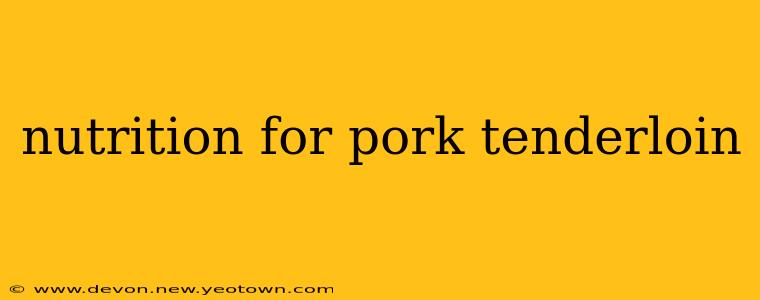Pork tenderloin. Just the name conjures images of succulent slices, perfectly seasoned, and ready to grace any table. But beyond its delectable taste lies a surprisingly nutritious profile. This isn't your grandma's tough, dry pork chop. Today's pork tenderloin is lean, versatile, and packed with essential nutrients that make it a fantastic addition to a healthy diet. Let's delve into the juicy details of pork tenderloin nutrition.
How Many Calories Are in Pork Tenderloin?
This is a common question, and the answer, like most things in nutrition, depends on the preparation. A 3-ounce serving of cooked pork tenderloin typically contains around 130-150 calories. However, this number can fluctuate based on cooking methods (added oils or fats significantly increase calorie content), added seasonings, and portion size. Remember, mindful cooking and portion control are key to maintaining a healthy calorie intake.
Is Pork Tenderloin High in Protein?
Absolutely! Pork tenderloin is an excellent source of high-quality protein, boasting approximately 25-30 grams per 3-ounce serving. Protein is crucial for building and repairing tissues, supporting a healthy immune system, and keeping you feeling full and satisfied. This makes pork tenderloin a fantastic choice for those looking to increase their protein intake, whether for muscle growth, weight management, or overall health.
What Vitamins and Minerals Are in Pork Tenderloin?
Beyond protein, pork tenderloin offers a wealth of essential vitamins and minerals. It’s a good source of:
- Niacin (Vitamin B3): Important for energy metabolism and maintaining healthy skin.
- Thiamin (Vitamin B1): Crucial for nerve function and carbohydrate metabolism.
- Vitamin B6: Plays a vital role in brain development and function, and red blood cell formation.
- Selenium: An antioxidant that protects cells from damage.
- Phosphorus: Essential for bone health and energy production.
- Zinc: Supports immune function and wound healing.
These nutrients contribute to various bodily functions, making pork tenderloin a well-rounded nutritional choice.
Is Pork Tenderloin Healthy?
The healthfulness of pork tenderloin largely depends on how it's prepared. A lean cut cooked with minimal added fat and oils is undoubtedly a healthy option. However, heavily processed pork tenderloin, or those prepared with excessive amounts of butter, oil, or sugary sauces, can significantly impact its nutritional profile.
Choosing lean cuts, opting for healthy cooking methods (grilling, baking, or pan-searing with a minimal amount of oil), and controlling portion sizes are all essential to maximizing the health benefits of this delicious meat.
How Much Pork Tenderloin Should I Eat?
The recommended serving size for pork tenderloin is typically 3-4 ounces. Individual needs may vary based on factors like age, activity level, and overall dietary goals. Consulting a registered dietitian or nutritionist can help determine the appropriate serving size for your specific needs.
Is Pork Tenderloin Good for Weight Loss?
As a lean protein source, pork tenderloin can be a valuable part of a weight loss diet. The high protein content promotes satiety, helping you feel fuller for longer and reducing overall calorie intake. However, remember that portion control and a balanced diet are crucial for successful weight loss. Don't rely solely on pork tenderloin; incorporate a variety of fruits, vegetables, and whole grains for optimal health and weight management.
What Are the Best Ways to Cook Pork Tenderloin?
The versatility of pork tenderloin is a major advantage. You can grill it, bake it, pan-sear it, or even slow-cook it. Experiment with different herbs, spices, and marinades to enhance its flavor and create delicious and healthy meals. Remember to use a meat thermometer to ensure it reaches an internal temperature of 145°F (63°C) for food safety.
This journey into the world of pork tenderloin nutrition reveals it to be a much more than just a delicious protein source. It's a versatile and nutrient-rich food that can easily be incorporated into a balanced and healthy diet, providing you with a satisfying and nutritious meal. Remember always to prioritize healthy cooking methods and portion control to maximize the benefits.

